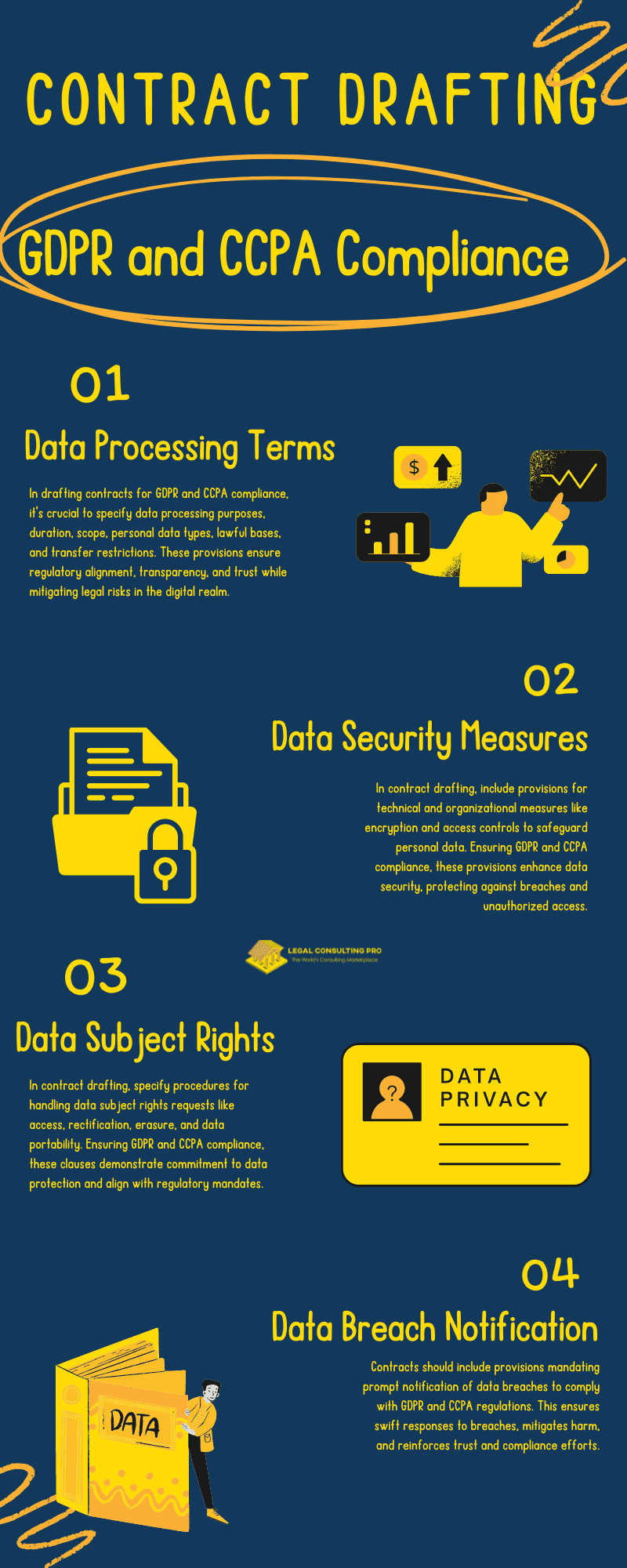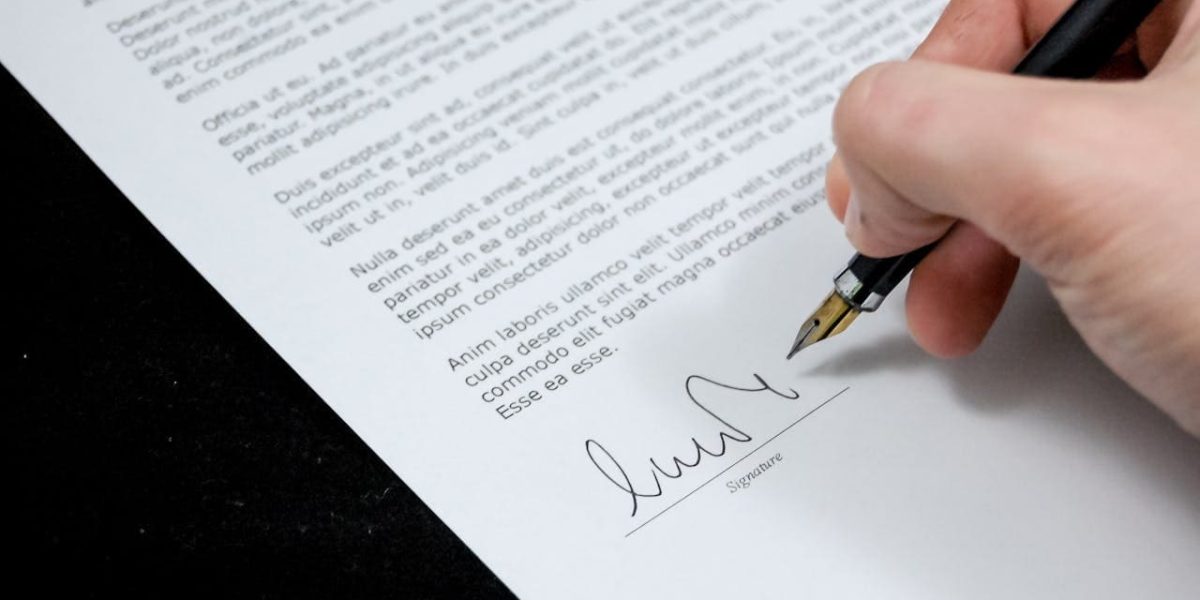In today’s interconnected digital landscape, data privacy has emerged as a critical concern for businesses operating on a global scale. With the enactment of stringent regulations such as the General Data Protection Regulation (GDPR) in Europe and the California Consumer Privacy Act (CCPA) in the United States, organizations face a complex web of legal obligations when it comes to handling personal data. This article explores the challenges of ensuring GDPR and CCPA compliance in international contract drafting, with a focus on contract drafting and contract management strategies.
Understanding GDPR and CCPA Compliance
The implementation of the General Data Protection Regulation (GDPR) in May 2018 marked a significant shift in how organizations handle personal data within the European Union (EU) and European Economic Area (EEA). This comprehensive regulation imposes stringent requirements on data collection, processing, and protection, granting individuals enhanced control over their personal information. Non-compliance with GDPR can result in substantial fines, highlighting the imperative for organizations to adhere to its provisions.
Similarly, the California Consumer Privacy Act (CCPA), effective in January 2020, introduced robust data privacy protections for California residents. The CCPA empowers individuals with rights over their personal information, including the right to know what data is collected and shared by businesses. Additionally, it imposes disclosure requirements on businesses regarding their data practices.
Navigating GDPR and CCPA compliance in international contract drafting presents unique challenges due to the differing frameworks and complexities of cross-border data transfers. The GDPR applies to organizations processing the personal data of individuals within the EU and EEA, while the CCPA focuses on businesses operating in California. As such, organizations conducting international business must carefully navigate the intricacies of both regulations to ensure compliance.
Contract drafting and contract management play a pivotal role in addressing these challenges and maintaining compliance throughout the contractual lifecycle. By incorporating specific provisions addressing data protection requirements into contracts, organizations can ensure alignment with GDPR and CCPA obligations. Furthermore, robust contract management processes facilitate ongoing compliance monitoring, documentation, and adaptation to evolving regulatory landscapes.
In summary, GDPR and CCPA compliance in international contract drafting necessitates a nuanced understanding of the regulations and meticulous attention to contract drafting and contract management. By navigating these challenges effectively, organizations can uphold data privacy standards, mitigate legal risks, and foster trust with customers and partners in an increasingly regulated digital environment.
Contract Drafting for GDPR and CCPA Compliance
Effective contract drafting is essential for ensuring GDPR and CCPA compliance in international contracts. Contract drafting should include specific provisions that address data protection obligations, rights, and responsibilities of the parties involved. Key considerations include:
- Data Processing Terms: In contract drafting for GDPR and CCPA compliance, it’s crucial to meticulously outline the purposes, duration, and scope of data processing activities. This entails specifying the types of personal data being processed, the lawful bases for processing, and any restrictions on data transfers. By providing detailed provisions within contracts, organizations ensure alignment with regulatory requirements, transparency in data handling practices, and accountability for data processing activities. This proactive approach not only mitigates legal risks but also fosters trust with customers and partners, demonstrating a commitment to protecting individuals’ privacy rights in an increasingly regulated digital landscape.
- Data Security Measures: In contract drafting, it’s crucial to include provisions mandating the adoption of suitable technical and organizational measures to safeguard personal data. These measures may encompass encryption, access controls, data minimization, and regular security assessments. By embedding such provisions into contract drafting, organizations not only bolster their compliance with data protection regulations like GDPR and CCPA but also enhance data security standards, thereby safeguarding sensitive information against potential breaches and unauthorized access.
- Data Subject Rights: In the process of contract drafting, it is essential to incorporate clauses outlining the steps for handling data subject rights requests, including access, rectification, erasure, and data portability. This adherence ensures compliance with GDPR and CCPA mandates, which grant individuals increased authority over their data. By articulating precise procedures for addressing such requests within contractual agreements, organizations underscore their dedication to data protection and facilitate alignment with regulatory stipulations.
- Data Breach Notification: Contract drafting must mandate prompt notification of data breaches to relevant supervisory authorities and affected individuals, as stipulated by GDPR and CCPA mandates. This ensures compliance with regulatory requirements and facilitates timely response to breaches, mitigating potential harm to individuals and legal consequences for organizations. By including these provisions, contracts demonstrate a commitment to transparency, accountability, and data protection, fostering trust with stakeholders and reinforcing compliance efforts in the face of evolving data privacy regulations.

Contract Management for GDPR and CCPA Compliance
Effective contract management is crucial for ensuring ongoing compliance with the General Data Protection Regulation (GDPR) and the California Consumer Privacy Act (CCPA) throughout the lifecycle of international contract drafting. This encompasses several key aspects:
- Contract Management: Organizations must establish robust processes for managing the entire lifecycle of contracts. This includes regularly reviewing, updating, and renewing contracts as necessary to align with changes in data protection laws and regulations. By keeping contracts current, organizations can adapt to evolving compliance requirements and mitigate the risk of non-compliance.
- Monitoring and Compliance Tracking: Utilizing contract management software and tools enables organizations to monitor compliance with GDPR and CCPA requirements. This involves tracking data processing activities, managing data subject requests, and ensuring consent mechanisms are in place and adhered to. By proactively monitoring compliance, organizations can identify and address potential issues before they escalate.
- Vendor Management: Organizations must implement robust vendor contract management processes to ensure that third-party vendors and service providers comply with GDPR and CCPA requirements when processing personal data on behalf of the organization. This involves conducting due diligence on vendors, establishing contractual agreements that include data protection provisions, and monitoring vendor compliance throughout the relationship.
- Record-Keeping and Documentation: Maintaining accurate records and documentation is essential for demonstrating accountability and transparency to regulatory authorities. Organizations should document contractual agreements, data processing activities, and compliance efforts in detail. This documentation serves as evidence of compliance in the event of an audit or investigation and helps organizations identify areas for improvement.
By effectively managing contracts and adhering to these practices, organizations can ensure ongoing compliance with GDPR and CCPA requirements, mitigate the risk of regulatory penalties, and build trust with customers and stakeholders.
Conclusion
Navigating GDPR and CCPA compliance in international contracts requires careful attention to contract drafting and contract management practices. By incorporating specific provisions addressing data protection obligations, rights, and responsibilities into contracts and implementing robust contract management processes, organizations can mitigate the risks of non-compliance and safeguard personal data under GDPR and CCPA requirements. By taking a proactive approach to data privacy in international contracts, organizations can build trust with customers, enhance their reputation, and avoid costly penalties and legal consequences associated with data breaches and regulatory violations.
Read similar blogs:







































